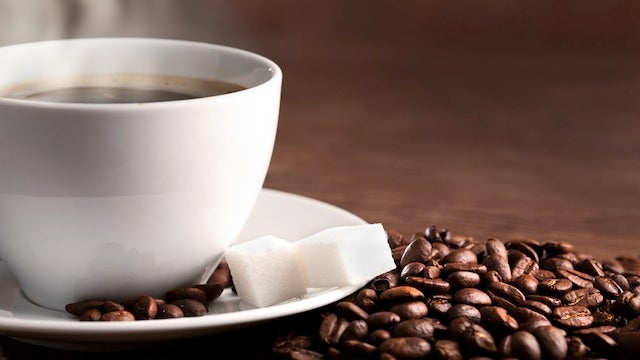The Science Behind Coffee and Why it's Actually Good for Your Health
Coffee isn't just warm and energizing, it may also be extremely good for you. In recent years, scientists have studied the effects of coffee on various aspects of health and their results have been nothing short of amazing.
Here's why coffee may actually be one of the healthiest beverages on the planet.
Coffee Can Make You Smarter
Coffee doesn't just keep you awake, it may literally make you smarter as well. The active ingredient in coffee is caffeine, which is a stimulant and the most commonly consumed psychoactive substance in the world. Caffeine's primary mechanism in the brain is blocking the effects of an inhibitory neurotransmitter called Adenosine. By blocking the inhibitory effects of Adenosine, caffeine actually increases neuronal firing in the brain and the release of other neurotransmitters like dopamine and norepinephrine (1, 2). Many controlled trials have examined the effects of caffeine on the brain, demonstrating that caffeine can improve mood, reaction time, memory, vigilance and general cognitive function (3).
Bottom Line: Caffeine potently blocks an inhibitory neurotransmitter in the brain, leading to a net stimulant effect. Controlled trials show that caffeine improves both mood and brain function.
Coffee Can Help You Burn Fat and Improves Physical Performance
There's a good reason why you will find caffeine in most commercial fat burning supplements. Caffeine, partly due to its stimulant effect on the central nervous system, both raises metabolism and increases the oxidation of fatty acids (4, 5, 6). Caffeine can also improve athletic performance by several mechanisms, including by mobilizing fatty acids from the fat tissues (7, 8). In two separate meta-analyses, caffeine was found to increase exercise performance by 11-12% on average (9, 10).
Bottom Line: Caffeine raises the metabolic rate and helps to mobilize fatty acids from the fat tissues. It can also enhance physical performance.
Coffee May Drastically Lower Your Risk of Type II Diabetes
Type II diabetes is a lifestyle-related disease that has reached epidemic proportions, having increased 10-fold in a few decades and now afflicting about 300 million people. This disease is characterized by high blood glucose levels due to insulin resistance or an inability to produce insulin. In observational studies, coffee has been repeatedly associated with a lower risk of diabetes. The reduction in risk ranges from 23% all the way up to 67% (11, 12, 13, 14). A massive review article looked at 18 studies with a total of 457,922 participants. Each additional cup of coffee per day lowered the risk of diabetes by 7%. The more coffee people drank, the lower their risk (15).
Bottom Line: Drinking coffee is associated with a drastically reduced risk of type II diabetes. People who drink several cups per day are the least likely to become diabetic.
Coffee May Lower Your Risk of Alzheimer's and Parkinson's
Not only can coffee make you smarter in the short term, it may also protect your brain in old age. Alzheimer's disease is the most common neurodegenerative disorder in the world and a leading cause of dementia. In prospective studies, coffee drinkers have up to a 60% lower risk of Alzheimer's and dementia (16, 17, 18). Parkinson's is the second most common neurodegenerative disorder, characterized by death of dopamine-generating neurons in the brain. Coffee may lower the risk of Parkinson's by 32-60% (19, 20, 21, 22).
Bottom Line: Coffee is associated with a much lower risk of dementia and the neurodegenerative disorders Alzheimer's and Parkinson's.
Coffee May be Extremely Good For Your Liver
The liver is a remarkable organ that carries out hundreds of vital functions in the body. It is very vulnerable to modern insults such as excess consumption of alcohol and fructose. Cirrhosis is the end stage of liver damage caused by diseases like alcoholism and hepatitis, where liver tissue has been largely replaced by scar tissue. Multiple studies have shown that coffee can lower the risk of cirrhosis by as much as 80%, the strongest effect for those who drank 4 or more cups per day (23, 24, 25). Coffee may also lower the risk of liver cancer by around 40% (26, 27).
Bottom Line: Coffee appears to be protective against certain liver disorders, lowering the risk of liver cancer by 40% and cirrhosis by as much as 80%.
Coffee May Decrease Your Risk of Dying
Many people still seem to think that coffee is unhealthy. This isn't surprising though, since it is very common for conventional wisdom to be at exact odds with what the actual studies say. In two very large prospective epidemiological studies, drinking coffee was associated with a lower risk of death by all causes (28). This effect is particularly profound in type II diabetics, one study showing that coffee drinkers had a 30% lower risk of death during a 20 year period (29).
Bottom Line: Coffee consumption has been associated with a lower risk of death in prospective epidemiological studies, especially in type II diabetics.
Coffee is Loaded With Nutrients and Antioxidants
Coffee isn't just black water. Many of the nutrients in the coffee beans do make it into the final drink, which actually contains a decent amount of vitamins and minerals.
A cup of coffee contains (30):
6% of the RDA for Pantothenic Acid (Vitamin B5).
11% of the RDA for Riboflavin (Vitamin B2).
2% of the RDA for Niacin (B3) and Thiamine (B1).
3% of the RDA for Potassium and Manganese.
May not seem like much, but if you drink several cups of coffee per day then this quickly adds up.
11% of the RDA for Riboflavin (Vitamin B2).
2% of the RDA for Niacin (B3) and Thiamine (B1).
3% of the RDA for Potassium and Manganese.
May not seem like much, but if you drink several cups of coffee per day then this quickly adds up.
But this isn't all. Coffee also contains a massive amount of antioxidants. In fact, coffee is the biggest source of antioxidants in the western diet, outranking both fruits and vegetables combined (31, 32, 33).
Bottom Line: Coffee contains a decent amount of several vitamins and minerals. It is also the biggest source of antioxidants in the modern diet.
Take Home Message
Even though coffee in moderate amounts is good for you, drinking way too muchof it can still be harmful. I'd also like to point out that many of the studies above were epidemiological in nature. Such studies can only show association, they can not prove that coffee caused the effects. To make sure to preserve the health benefits, don't put sugar or anything nasty in your coffee! If it tends to affect your sleep, then don't drink it after 2pm. At the end of the day, it does seem quite clear that coffee is NOT the villain it was made out to be. If anything, coffee may literally be the healthiest beverage on the planet.
Why is Coffee Good For You? Here are 7 Reasons | Authority Nutrition
Kristjan Gunnarsson is a medical student, professional blogger, certified personal trainer and a fitness and health enthusiast. His main passions in life are health and nutrition and he contributes to Authority Nutrition every week, with fresh ideas on weight loss, nutrition, and the things that are required to gain optimal health.
Image via Shutterstock.
Want to see your work on Lifehacker? Email Tessa.
The following replies are approved. To see additional replies that are pending approval, click Show Pending. Warning: These may contain graphic material.
 AndyAhernKris Gunnars2/25/13 7:39amCan we have more articles only highlighting the positive aspects of highly addictive drugs?Reply
AndyAhernKris Gunnars2/25/13 7:39amCan we have more articles only highlighting the positive aspects of highly addictive drugs?Reply





 crashfrogKris Gunnars
crashfrogKris Gunnars austin.daccicrashfrog
austin.daccicrashfrog ColdMagneticSuncrashfrog
ColdMagneticSuncrashfrog fritzk33Kris Gunnars
fritzk33Kris Gunnars binaryvisionsfritzk33
binaryvisionsfritzk33 Gemmabetafritzk33
Gemmabetafritzk33 BTownTKDKris Gunnars
BTownTKDKris Gunnars Bassmaster22BTownTKD
Bassmaster22BTownTKD dlthewaveBTownTKD
dlthewaveBTownTKD TK9K1BTownTKD
TK9K1BTownTKD From the country, 9 June 1508.AndyAhern
From the country, 9 June 1508.AndyAhern drive_by_burnerFrom the country, 9 June 1508.
drive_by_burnerFrom the country, 9 June 1508. Meetloaf13Kris Gunnars
Meetloaf13Kris Gunnars lollipopKABOOMMeetloaf13
lollipopKABOOMMeetloaf13 JaniceWaffleMeetloaf13
JaniceWaffleMeetloaf13
No comments:
Post a Comment
Please leave a comment-- or suggestions, particularly of topics and places you'd like to see covered